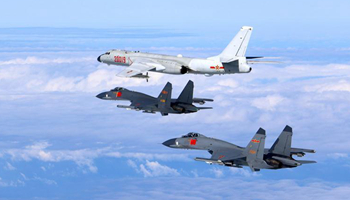by Fei Liena, Ban Wei
BEIJING, March 5 (Xinhua) -- The year 2017 is bound to be unusual as the world is experiencing many uncertainties and the international order faces profound adjustments.
"What's wrong with this world?" "How to realize lasting peace and development for humanity?" China's ongoing "two sessions," with discussions ranging from domestic issues to foreign policies, hopefully will offer some answers.
The annual gatherings of the top legislature and the top political advisory body, dubbed as the "two sessions," are among the most important political events for the world's second largest economy.
The fifth session of the 12th National People's Congress (NPC), and the fifth session of the 12th National Committee of the Chinese People's Political Consultative Conference, are being held from March 3 to 15.
CHINA'S PLAN: COOPERATION & WIN-WIN
Four years ago in Russia, Chinese President Xi Jinping proposed the concept of building "a community of common destiny for mankind." About two months ago, when giving a speech at the United Nations Office in Geneva, Xi expounded his concept in a comprehensive, profound and systematic manner.
The world today is at a critical stage of change. Anti-globalization is on the rise; terrorism, refugee crisis, climate change and other global challenges are still daunting; the world economy is in a constant downturn; instability and uncertainty have become "the new normal."
These complicated issues have evolved beyond the handling capacity of a single country. Nations of this world have increasingly become "a community of common destiny."
The Tower of Babel collapsed for a lack of cooperation. In today's globalized world, countries rarely stand or fall alone. Thus cooperation is the inevitable choice, while mutual benefit and win-win are the right way for joint development.
Holding this belief, China hopes to work with other countries to bake a bigger cake and seek common interests.
According to British scholar Martin Jacques, China has provided a new possibility, that is, abandoning the zero-sum game and replacing it with cooperation and mutual benefits.
CHINA'S PATH: SUSTAINABLE DEVELOPMENT
At the G20 Hangzhou summit, China for the first time put "development" on top of the agenda, and mapped out a systematic action plan surrounding the implementation of the 2030 Agenda for Sustainable Development.
The concept of "inclusive and coordinated development," proposed by China, targets the world's unequal and unbalanced development issues, and reveals China's determination to push all economies and all industries to develop in a coordinated manner, and to enable people from all walks of life to enjoy common prosperity.
From the ten cooperative projects in Central Africa, to supporting the industrial cooperation proposal for Africa and least-developed countries, to establishing the South-South cooperation aid fund, to the most influential Belt and Road Initiative, a series of proposals and actions from China are aimed at eliminating the global development gap and making development fruits enjoyed by all.
David Nabarro, a UN special adviser on 2030 Agenda for Sustainable Development, said last year that China has made a real and considerable effort to tackle a set of global goals for sustainable development to end poverty, inequality and combat climate change.
In February, the concept of building a community of common destiny for mankind was incorporated for the first time into a UN resolution.
Philipp Charwath, chair of the 55th session of the UN Commission for Social Development, noted that Xi's proposal has offered inspiration to a world beset by rising challenges and risks.
"In the long run, it profits us all," Charwath said. "I think that's how I understand the concept, and that's how the UN work can profit from the concept."
CHINA'S RESPONSIBILITY: BUILDING GLOBAL GOVERNANCE TOGETHER
At the G20 Hangzhou summit, Xi expounded China's policies and proposals on global governance based on equality, guided by opening up, motivated by cooperation, and to be shared by all.
According to Ross Terrill, a research associate at Harvard University's Fairbank Center, China's global governance idea centered on the goal of building "a community of common destiny" has shown the country's strategic thoughts on the long-term development of bilateral ties between China and other countries, and has injected new impetus into the effort to establish a new international order.
Observers say the smoothly-running Asian Investment Bank and BRICS New Development Bank, as well as the fact that China has become a formal member of European Bank for Reconstruction and Development, and China's currency RMB has joined the IMF's Special Drawing Rights (SDR) basket, among others, show China's increasing role in the deepening global financial cooperation and the betterment of the international financial governance system.
During the first half of March, delegates from all over China are meeting for the "two sessions" to give proposals and suggestions to the government and the parliament to help better build the country.
China observers say China's sharing with the world of its experience and wisdom of governing the country is conducive to building a better world.




















